Overview
The article emphasizes the significant advantages of healthcare cloud services for SaaS product owners. With enhanced data security, improved collaboration, cost-effectiveness, and better patient experiences, these benefits are not just theoretical; they are backed by real-world examples of successful implementations. Such cases illustrate how cloud technology can streamline operations and elevate care delivery within the healthcare sector.
Consider the impact of these services: they not only protect sensitive information but also foster teamwork among healthcare professionals, ultimately leading to superior patient outcomes. By leveraging cloud solutions, SaaS product owners can reduce operational costs while enhancing service quality.
In conclusion, embracing healthcare cloud services is not merely a choice; it’s a strategic move towards innovation and efficiency in the healthcare landscape. For SaaS product owners looking to stay ahead, the time to act is now.
Introduction
Healthcare cloud services are revolutionizing the medical operations landscape, delivering innovative solutions that significantly enhance efficiency, security, and patient care. As the healthcare sector increasingly adopts these digital advancements, SaaS product owners can gain invaluable insights into how cloud technology streamlines processes and improves outcomes. Yet, with these advancements come challenges, particularly in navigating complex regulatory landscapes and ensuring robust data security.
What are the key benefits of healthcare cloud services that can empower organizations to thrive in this evolving environment? Understanding these advantages is crucial for any organization looking to stay ahead in a competitive market. Embracing cloud technology not only optimizes operational efficiency but also enhances patient experiences, ultimately leading to better health outcomes.
As we delve deeper into this topic, we will explore how these services can transform healthcare delivery, making it more agile and responsive to patient needs. The time to act is now—leveraging healthcare cloud services can position your organization for success in a rapidly changing landscape.
SDA: Custom Software Development for Enhanced Healthcare Cloud Solutions
SDA stands out as a leader in custom software development tailored specifically for the medical sector. Our healthcare cloud services are meticulously designed to meet the unique needs of medical providers. By leveraging advanced technologies and prioritizing user-oriented design, SDA enhances the functionality and accessibility of medical applications. This strategic approach empowers providers to elevate care quality and streamline operational workflows.
Moreover, we tackle the specific challenges faced by medical organizations, such as information security and regulatory compliance. SDA aligns with industry regulations and standards, ensuring safety within healthcare cloud services environments. Our healthcare cloud services incorporate robust security protocols, including encryption and role-based access controls, which are essential for maintaining HIPAA compliance and protecting patient information.
As the demand for customized software solutions continues to rise, SDA remains at the forefront of innovation. We deliver applications that facilitate seamless integration and interoperability, ultimately transforming healthcare delivery. Trust SDA to provide the expertise and solutions necessary for navigating the complexities of the medical landscape.
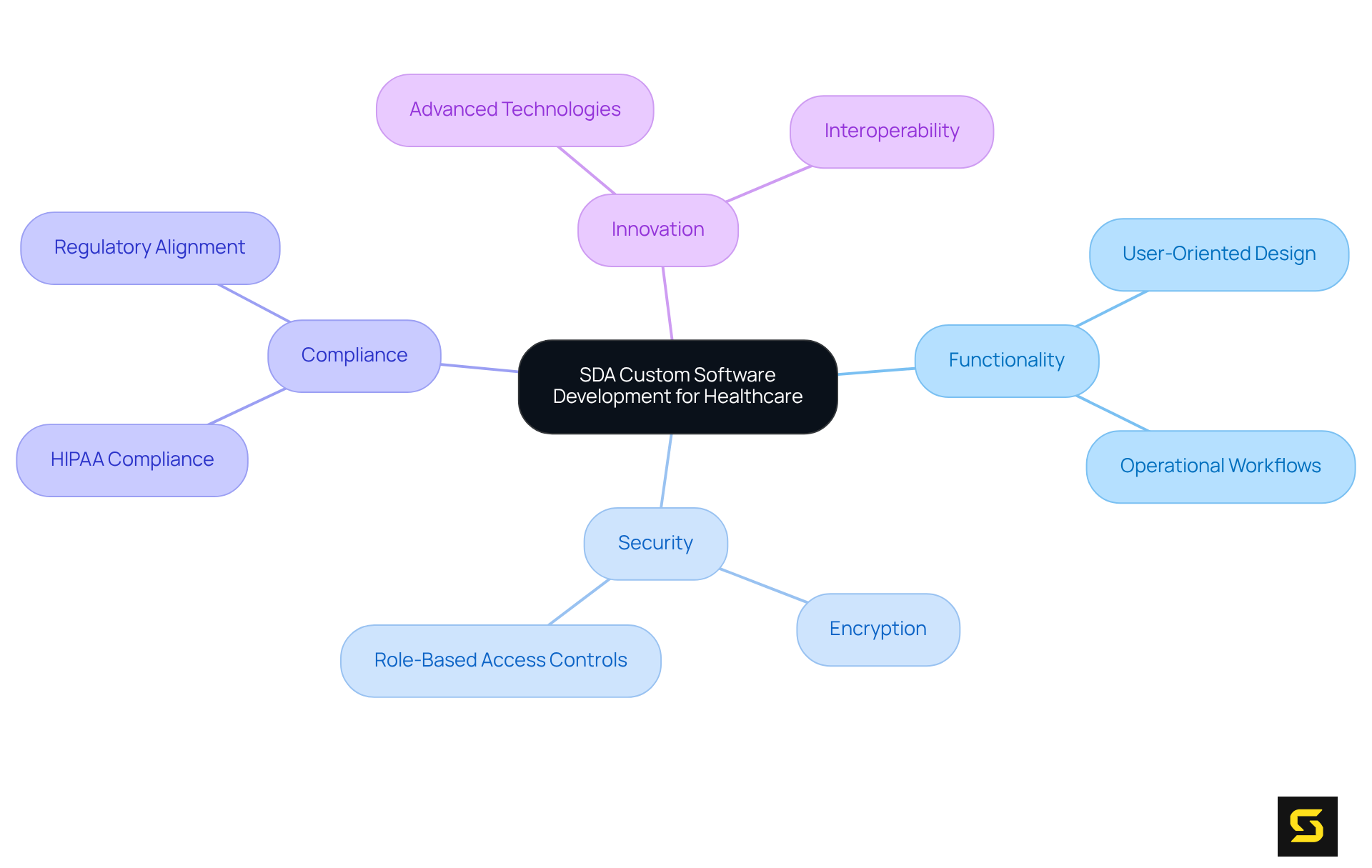
Enhanced Data Security and Regulatory Compliance in Healthcare Cloud Services
Healthcare online services play a crucial role in enhancing information security, employing advanced encryption, stringent access controls, and regular audits. These robust measures are vital for protecting sensitive patient information from breaches and unauthorized access. Alarmingly, medical information breaches have surged by over 55% in the past two years, with 1,160 incidents recorded in 2024. This statistic underscores the growing reliance on secure online solutions.
Moreover, leading providers of healthcare cloud services adhere to compliance protocols that align with regulations such as HIPAA. This ensures that healthcare organizations operate within legal frameworks while harnessing the power of healthcare cloud services. By emphasizing both security and compliance, these measures not only protect information but also foster trust among individuals and stakeholders.
Organizations that adopt a multi-layered security strategy—incorporating automated compliance audits, risk evaluations, and a focus on third-party risk management—can significantly mitigate the risks associated with information breaches. Notably, 77% of all compromised records were linked to business associates or external vendors. By prioritizing these security measures, medical service providers can enhance operational integrity and maintain client confidence in their services.
In conclusion, the commitment to robust security practices is not just a regulatory requirement; it is a strategic imperative that safeguards patient information and builds trust in the healthcare system.
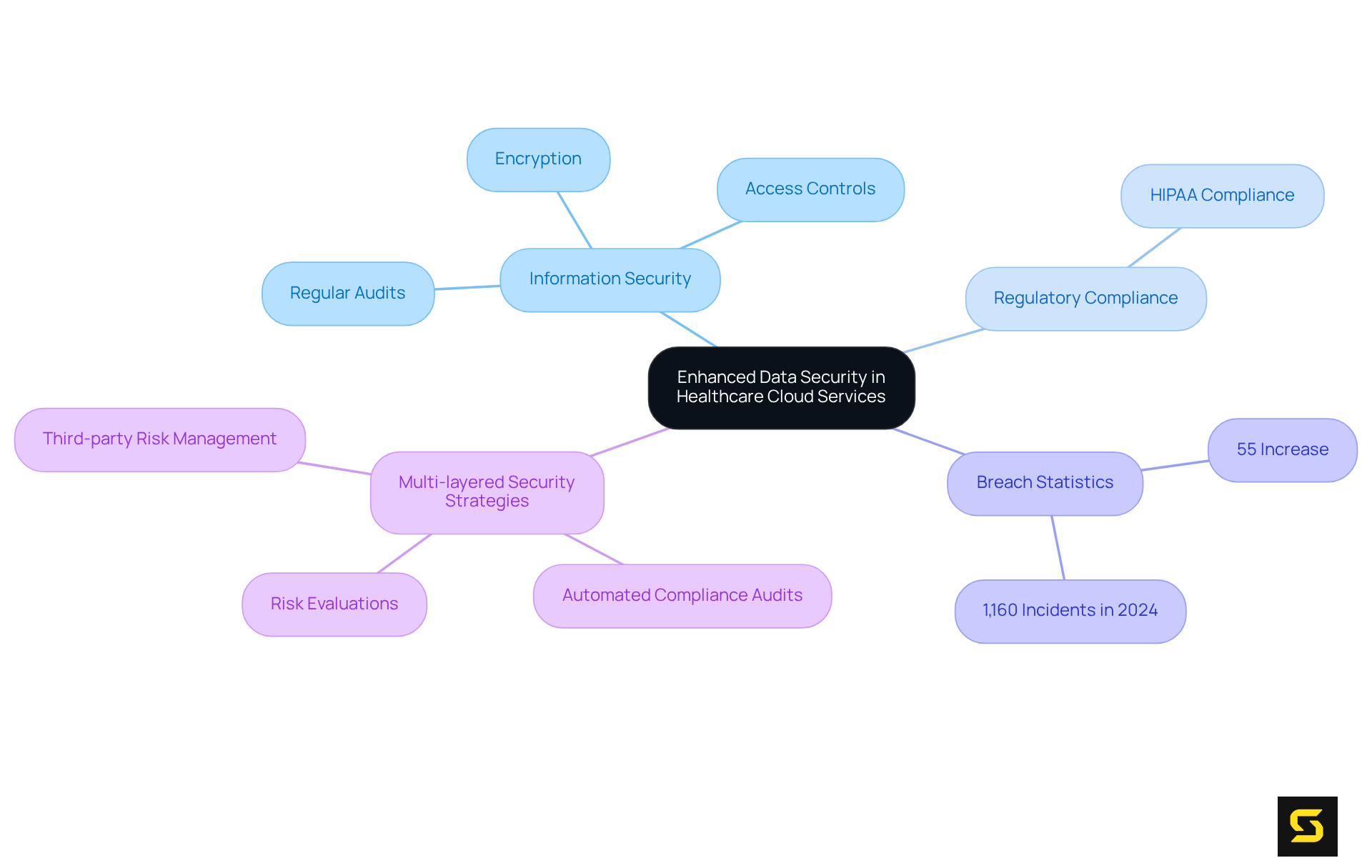
Seamless Collaboration and Accessibility Through Cloud Technology
Cloud technology revolutionizes collaboration among medical teams by providing real-time access to individual data and shared resources. This enhanced accessibility empowers medical professionals to communicate effectively, share insights, and make informed decisions swiftly, irrespective of their physical locations. Healthcare cloud services, including cloud-based electronic health records (EHRs) and telemedicine platforms, are pivotal in fostering teamwork, ultimately leading to improved care and operational efficiency. By dismantling traditional silos, these technological solutions enable healthcare providers to collaborate more effectively, thereby elevating the overall quality of care.
Moreover, utilizing healthcare cloud services to store medical information in secure online environments mitigates the risks of data breaches and ransomware attacks, which is essential for maintaining trust and complying with regulations. The integration of AI with online services further amplifies this collaboration; for instance, AI-generated medical histories and visit summaries can significantly enhance clinician preparedness before appointments, facilitating timely interventions in care.
Additionally, flexible pricing structures in online hosting can lead to substantial cost savings for medical organizations, making the adoption of healthcare cloud services increasingly appealing for product owners. Practical applications, such as the enhancement of remote patient monitoring features through online technology, illustrate the tangible benefits of these solutions. As Dr. Shafiq Rab underscores, leveraging technology to boost efficiency is vital in modern medical practice.
In conclusion, the amalgamation of internet-based technology and AI not only streamlines workflows but also bolsters data security, accessibility, and cost-effectiveness, establishing it as an indispensable component of contemporary medical operations.
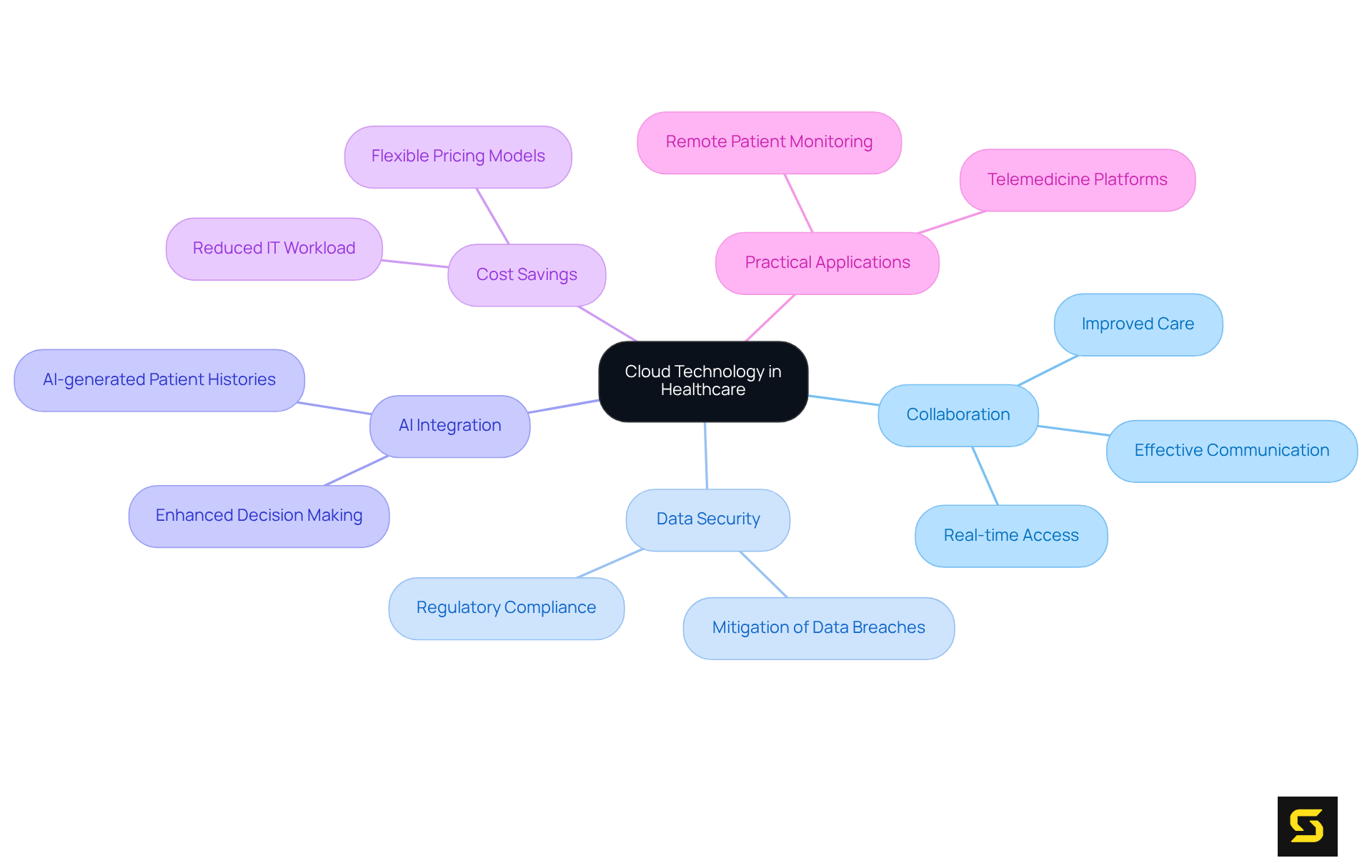
Cost-Effective and Scalable IT Infrastructure for Healthcare Providers
Healthcare cloud services offer a cost-effective IT framework that significantly reduces reliance on local hardware and maintenance. This innovative approach allows organizations to dynamically scale their IT resources based on demand, providing essential flexibility in budgeting and resource allocation. Such flexibility is particularly advantageous for service providers facing fluctuating client volumes or those expanding their offerings.
By leveraging healthcare cloud services, healthcare organizations can redirect financial resources towards patient care instead of IT expenses. This shift not only enhances operational efficiency but also strengthens the bottom line. Furthermore, healthcare cloud services eliminate the need for hefty initial investments in equipment and maintenance, enabling a pay-as-you-go model that frees up funds for healthcare initiatives.
For instance, Teladoc Health utilizes online technology to enhance its virtual care system, facilitating remote consultations that can be scaled according to individual needs. Similarly, hospitals have improved collaboration and information sharing among specialists through healthcare cloud services and scalable online solutions, ensuring that patient care remains a priority while effectively managing costs.
In conclusion, embracing healthcare cloud services is not just a trend; it’s a strategic move that empowers organizations to optimize resources and focus on what truly matters—providing exceptional care to individuals.
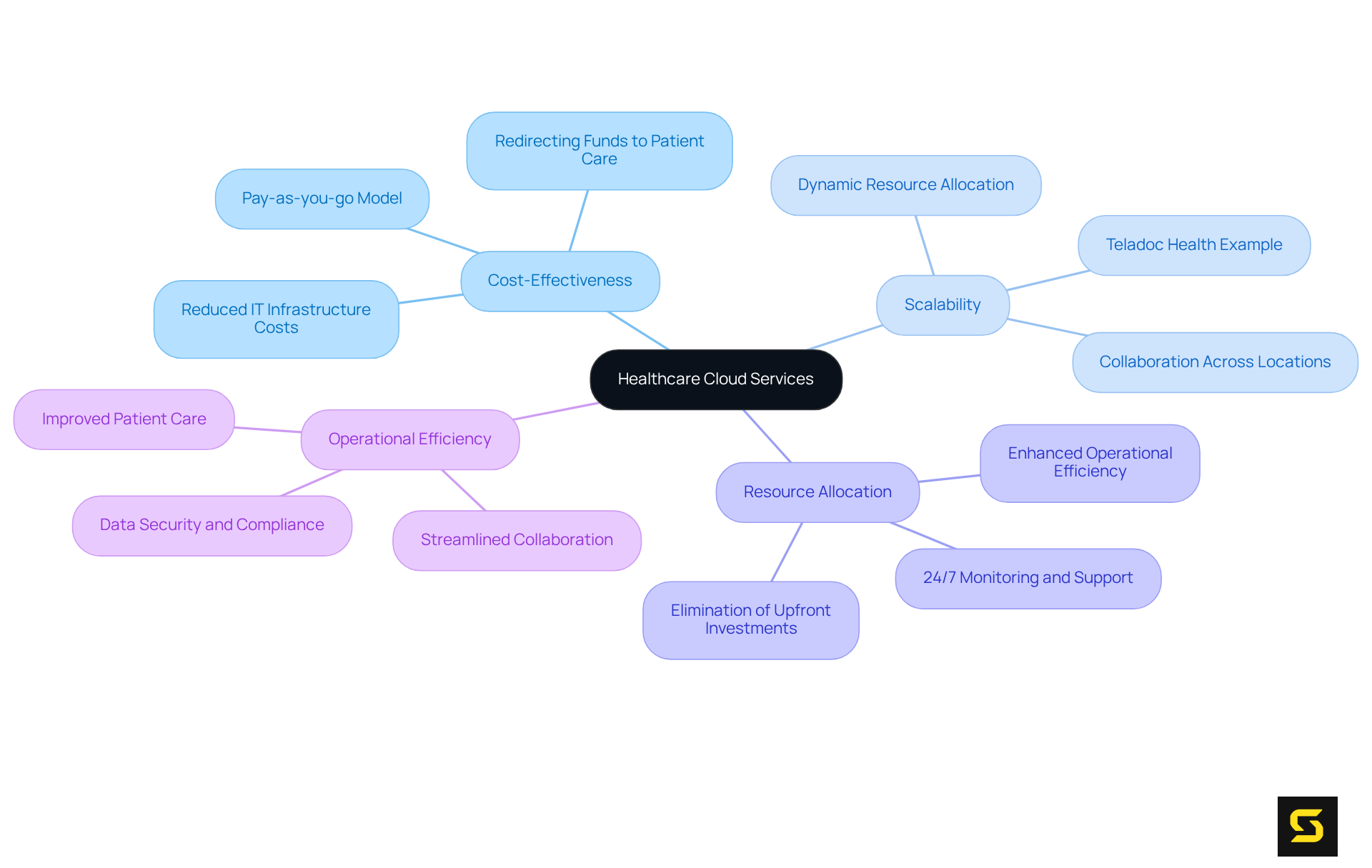
Improved Disaster Recovery and Risk Resilience with Cloud Services
Healthcare organizations can significantly enhance their disaster recovery capabilities through healthcare cloud services. By offering automated backups and redundant systems, these solutions ensure rapid recovery of essential data and applications in the event of data breaches or system failures. This capability minimizes downtime and guarantees continuity of care, which is crucial for maintaining patient trust and operational stability, especially during emergencies.
Consider this: automated failover mechanisms can reduce downtime from hours to mere minutes. This efficiency enables service providers to maintain access to critical systems, ensuring that patient care is never compromised. By leveraging online technology, medical organizations can develop comprehensive disaster recovery strategies that not only protect against potential threats but also enhance overall operational effectiveness.
Incorporating healthcare cloud services into medical risk management strategies enables providers to respond swiftly to disruptions, safeguarding client information and ensuring compliance with regulations like HIPAA. Non-compliance can lead to fines of up to $50,000 for infractions, making it imperative for healthcare organizations to adopt these solutions.
In conclusion, the integration of healthcare cloud services is not just a technological upgrade; it’s a strategic necessity for healthcare organizations aiming to protect their operations and their patients. Act now to fortify your disaster recovery plans and ensure your organization is prepared for any eventuality.
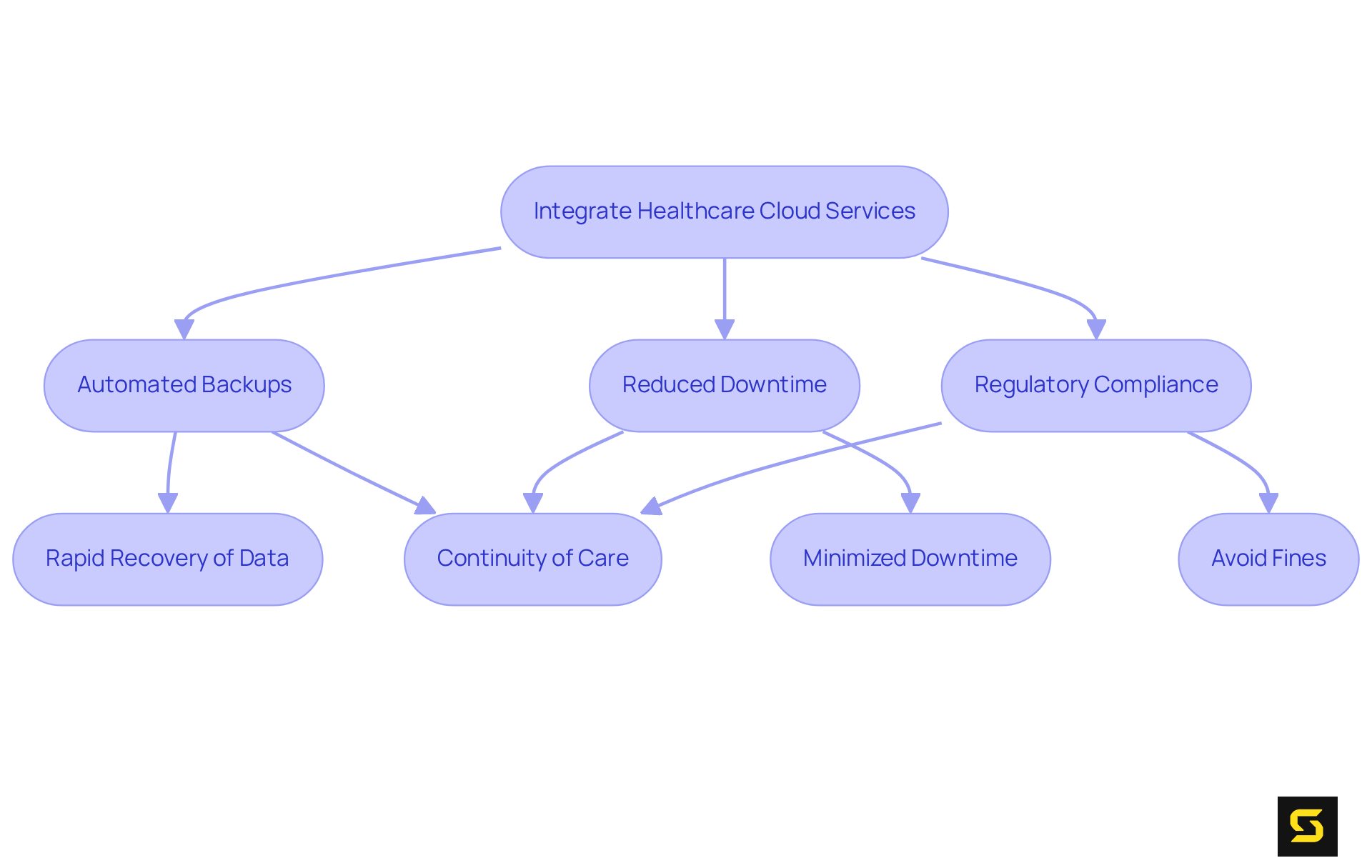
Accelerated Data Analysis and Patient Insights via Cloud Solutions
Healthcare cloud services empower medical organizations to swiftly and effectively analyze vast amounts of information. By harnessing advanced analytics tools from Inovalon, providers can uncover vital insights into health trends, treatment efficacy, and operational performance. This data-driven approach not only facilitates the creation of personalized care plans but also fosters proactive health management strategies, ultimately enhancing patient outcomes.
For instance, Inovalon’s integration with Snowflake allows payers in the medical sector to access real-time information, significantly reducing refresh periods by four to nine days. This acceleration in data availability streamlines decision-making processes, making it easier for organizations to respond to patient needs promptly. Furthermore, institutions like Mayo Clinic have adopted healthcare cloud services to manage extensive research data without incurring hefty IT infrastructure costs.
The ability to leverage healthcare cloud services not only supports informed decision-making but also elevates the quality of care, making it an indispensable tool for modern medical providers. As Ed Chidsey, President of Inovalon’s Insights Business Unit, pointed out, the potential for organizations to enhance research efforts and improve outcomes for individuals through data is substantial. Embrace these advancements to transform your approach to healthcare.
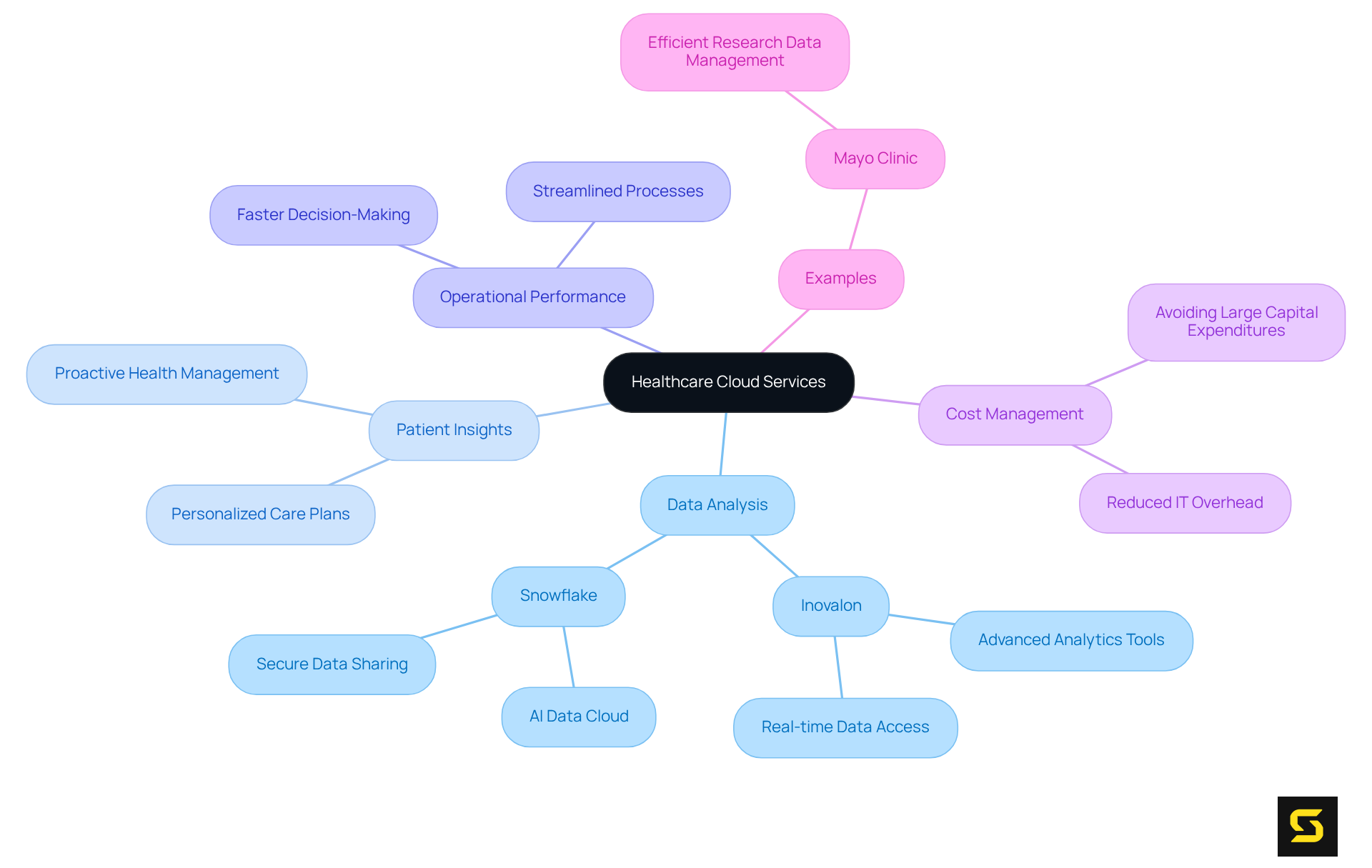
Integration with Electronic Health Records (EHR) for Streamlined Operations
Cloud technology is revolutionizing medical services by enabling seamless integration with electronic health records (EHR). This integration allows providers to access and share patient information effortlessly, streamlining workflows and significantly reducing administrative burdens. As a result, the accuracy of patient data improves, leading to better care coordination and a lower risk of errors.
For instance, healthcare personnel in Toronto have reported decreased workload stress thanks to AI-driven dashboards, showcasing the operational effectiveness achieved through these online solutions. A notable partnership between a leading Toronto hospital and Oracle Health Cloud AI exemplifies how healthcare cloud services can enhance operations, serving as a model for global medical modernization. Seema Verma highlighted that the new EHR was developed in a virtual environment tailored for the Agentic AI era, underscoring the transformative potential of these technologies.
By leveraging healthcare cloud services, medical organizations can achieve greater efficiency and deliver superior care, ultimately transforming patient outcomes. SaaS product owners should actively consider exploring partnerships with cloud service providers to enhance their product offerings and capitalize on these advancements.
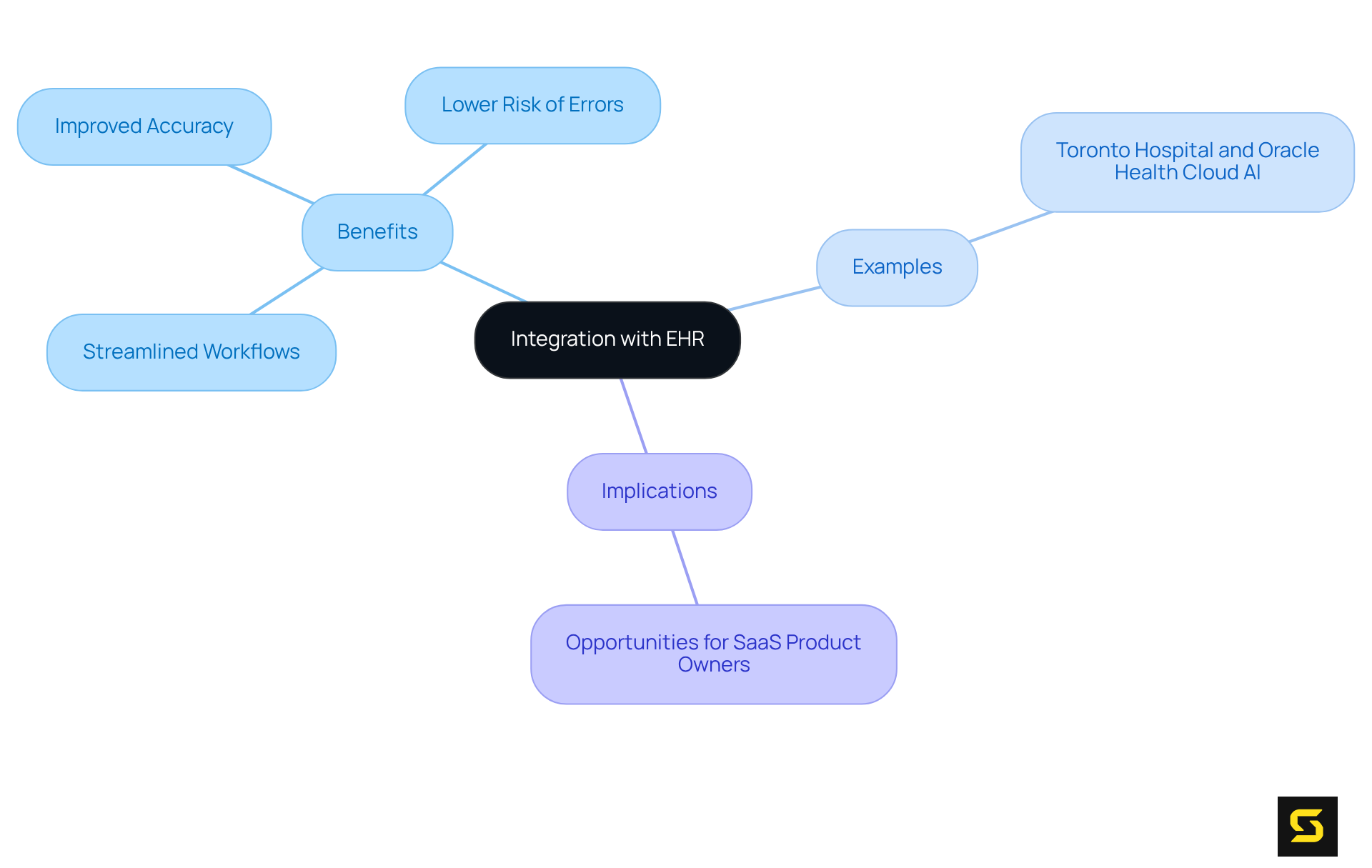
Telemedicine and Remote Healthcare Services Enabled by Cloud Technology
Healthcare cloud services stand as a cornerstone of telemedicine, enabling healthcare providers to deliver remote care with exceptional efficiency. By leveraging cloud-based platforms, providers can conduct virtual consultations, monitor individual health in real-time, and securely share medical information. This capability significantly expands access to care, especially for patients in rural or underserved areas, while enhancing the overall patient experience through increased convenience and flexibility.
Consider this: telehealth appointments surged by 154% in 2020, underscoring the growing reliance on online solutions for distant medical services. Furthermore, a staggering 83% of medical organizations now utilize healthcare cloud services for storing electronic health records, illustrating the widespread adoption of these technologies in the sector. Platforms like Cerner HealtheIntent and IBM Watson Health harness online computing to analyze vast datasets, paving the way for personalized treatment plans and proactive patient management.
As Matt Pacheco aptly notes, "Cloud computing in the medical field can enhance accessibility to data, lower IT expenses, facilitate collaboration among teams, and provide improved disaster recovery and security alternatives when set up correctly." This insight highlights the multifaceted benefits of cloud technology in healthcare.
In conclusion, the integration of telemedicine with healthcare cloud services is not merely transforming medical delivery; it is promoting a more accessible and patient-centered approach to care. Embrace this evolution in healthcare technology and consider how cloud solutions can enhance your practice.

Enhanced Patient Experience Through Cloud-Based Solutions
Healthcare cloud services are revolutionizing the user experience by providing seamless access to health information and services. Patients can effortlessly manage appointments, retrieve medical records, and communicate with healthcare providers through intuitive platforms. This level of accessibility empowers individuals to actively participate in their medical care, leading to heightened satisfaction and improved health outcomes. Looking ahead, future hospitals are poised to leverage cloud-based decision engines for diagnostics and resource allocation, significantly enhancing the efficiency of care delivery.
The integration of artificial intelligence (AI) and the Internet of Things (IoT) with online technologies further elevates engagement by enabling real-time information analysis and personalized care. For instance, healthcare cloud services, including cloud-based remote patient monitoring (RPM) platforms, play a crucial role in managing chronic illnesses, allowing healthcare professionals to intervene proactively based on real-time data.
However, as medical organizations adopt healthcare cloud services, prioritizing security, privacy, and regulatory compliance is paramount to protect sensitive patient information. Adhering to regulations like HIPAA is essential for maintaining trust and safeguarding health data.
Moreover, embracing digital technologies can lead to substantial cost savings. Medical organizations utilizing online PACS solutions can achieve up to a 40% reduction in overall expenses over six years. While the benefits are considerable, it is vital to acknowledge the challenges of computing in healthcare, including data security threats and potential vendor lock-in.
For SaaS product owners, focusing on these critical elements can provide valuable insights into effectively leveraging online solutions while navigating the complexities of the medical field.
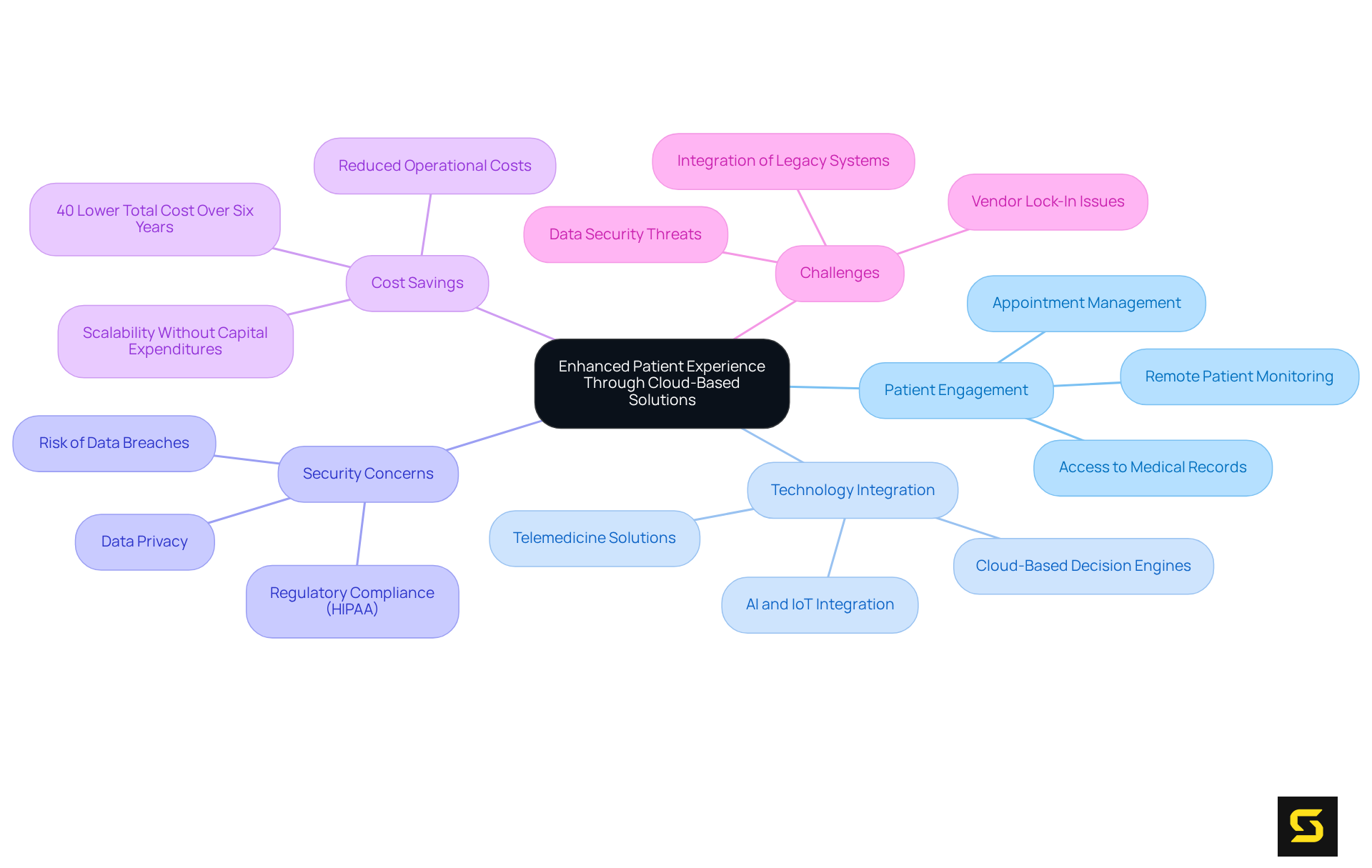
Real-World Examples of Cloud Technology Transforming Healthcare
Numerous healthcare organizations have successfully harnessed healthcare cloud services to revolutionize their operations. Take Intermountain Healthcare, for example. By implementing healthcare cloud services through Electronic Health Record (EHR) systems, they achieved a remarkable 40% reduction in claim processing time and significantly improved data accessibility. This transition not only streamlined administrative workflows but also enhanced care coordination among providers, showcasing the transformative power of digital solutions.
In another compelling case, a telemedicine provider leveraged online solutions to broaden its reach, facilitating virtual consultations for individuals in underserved regions. This innovation has proven vital in enhancing access to medical services, particularly for managing chronic conditions. According to Accenture, medical organizations that integrate healthcare cloud services with AI and data analytics will surpass their counterparts by 30% in operational efficiency and care delivery.
These real-world applications underscore the substantial advantages of online technology, illustrating its capacity to improve patient care, streamline operational efficiency, and foster innovation within the medical field. With the global healthcare cloud services market projected to reach $89.4 billion by 2027—driven by successful implementations like Pfizer's, which achieved significant cost savings during its cloud migration—the momentum for cloud adoption is undeniable. This trend paves the way for smarter, more efficient healthcare delivery.
Are you ready to embrace the future of healthcare? The time to act is now.
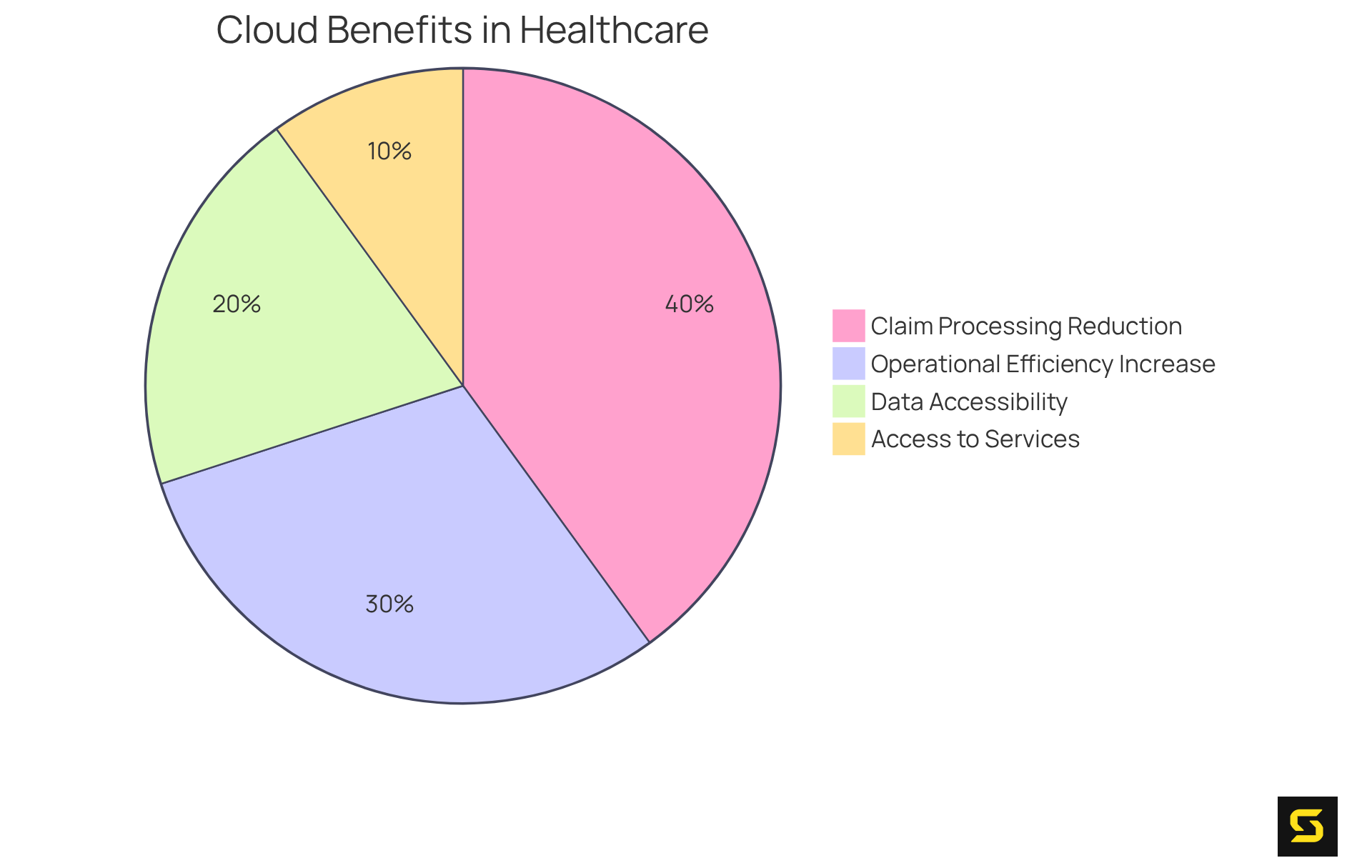
Conclusion
The power of healthcare cloud services is undeniable, as they significantly enhance operational efficiency, improve patient care, and ensure robust data security. By leveraging cloud technology, healthcare providers can streamline processes, facilitate collaboration, and offer a more accessible and personalized experience for patients. The integration of advanced analytics, electronic health records, and telemedicine solutions highlights the profound impact of cloud services on modern healthcare delivery.
Key benefits include:
- Enhanced data security and regulatory compliance
- Seamless collaboration among medical teams
- Cost-effective IT infrastructure
- Improved disaster recovery capabilities
- Accelerated data analysis
Real-world examples demonstrate how organizations are successfully adopting these technologies to optimize operations and improve patient outcomes. The shift towards cloud solutions is not just a trend; it’s a strategic necessity for healthcare providers navigating the complexities of the industry.
As the healthcare landscape evolves, embracing cloud technology becomes crucial for organizations aiming to enhance service delivery and patient satisfaction. SaaS product owners and healthcare providers must recognize the advantages of cloud solutions and take decisive steps toward integration. The future of healthcare is here, and the time to act is now—invest in cloud services to unlock the potential for improved healthcare outcomes and operational excellence.
Frequently Asked Questions
What is SDA's role in healthcare software development?
SDA is a leader in custom software development specifically tailored for the medical sector, focusing on enhancing healthcare cloud solutions to meet the unique needs of medical providers.
How does SDA enhance medical applications?
SDA enhances medical applications by leveraging advanced technologies and prioritizing user-oriented design, which improves functionality and accessibility for healthcare providers.
What challenges does SDA address for medical organizations?
SDA addresses challenges such as information security and regulatory compliance, ensuring safety within healthcare cloud service environments.
How does SDA ensure compliance with healthcare regulations?
SDA aligns its services with industry regulations and standards, incorporating robust security protocols like encryption and role-based access controls to maintain HIPAA compliance and protect patient information.
What is the significance of data security in healthcare cloud services?
Data security is crucial in healthcare cloud services, as it protects sensitive patient information from breaches and unauthorized access, especially given the surge in medical information breaches.
What measures are taken to enhance information security in healthcare?
Healthcare online services employ advanced encryption, stringent access controls, and regular audits to safeguard sensitive information and ensure compliance with regulations such as HIPAA.
What percentage of compromised records are linked to external vendors?
Notably, 77% of all compromised records were linked to business associates or external vendors, highlighting the importance of managing third-party risks.
How does cloud technology improve collaboration among medical teams?
Cloud technology provides real-time access to data and shared resources, enabling effective communication and collaboration among medical professionals, regardless of their physical locations.
What role do healthcare cloud services play in operational efficiency?
Healthcare cloud services, including cloud-based electronic health records (EHRs) and telemedicine platforms, foster teamwork and improve operational efficiency by dismantling traditional silos.
How does AI integration benefit healthcare cloud services?
The integration of AI with healthcare cloud services enhances collaboration by providing AI-generated medical histories and visit summaries, which prepare clinicians for appointments and facilitate timely interventions.
What are the cost benefits of adopting healthcare cloud services?
Flexible pricing structures in online hosting can lead to substantial cost savings for medical organizations, making the adoption of healthcare cloud services more appealing.
How do healthcare cloud services impact patient monitoring?
Healthcare cloud services enhance remote patient monitoring features, illustrating the tangible benefits of utilizing online technology in modern medical practice.





